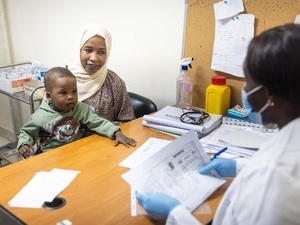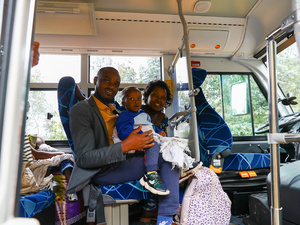Separation of civilian and military refugees begins in Democratic Republic of the Congo
Separation of civilian and military refugees begins in Democratic Republic of the Congo
KINSHASA, Oct. 16 (UNHCR) - Sixty-five former Central African Republic soldiers have been transferred from the border town of Zongo in the Democratic Republic of the Congo to a camp further inland in the first phase of an operation designed to maintain the civilian character of refugee sites, UNHCR said Tuesday.
The transfer is being carried out at UNHCR's request, which has insisted on separating the more than 24,000 civilian refugees and 1,250 former soldiers who fled the Central African Republic during an attempted coup in May.
The presence of both civilian and military refugees in the camps has become an increasing problem in recent years, whether in West Timor, eastern Zaire, or other areas. The actual separation of combatants has sometimes posed major problems. UNHCR insists that the civilian nature of the camps be preserved, ensuring the safety and security of refugees and surrounding host populations.
The former Central African Republic soldiers were taken by truck Monday from the border town of Zongo 120 kilometres inland to a site at Bokilio in the Democratic Republic of the Congo's Equateur Province. The operation is scheduled to continue Wednesday with the transfer of between 400 and 600 persons by U.N. peacekeepers to the new site, the agency said.
Truck convoys are scheduled to make the 24-hour trip every two days, completing the transfer of up to 2,500 people, including the former soldiers' families, within ten days, according to the agency. Those not physically able to make the overland trip will be transferred by helicopter. A doctor from a non-governmental organization is accompanying each convoy.
Peacekeepers from the U.N. mission to the Democratic Republic of the Congo (MONUC) registered the group of former soldiers and their families and secured their agreement for the move to the new site at Bokilio, according to the statement. Once the former soldiers have been moved, UNHCR said it will begin the transfer of the civilian refugees to a new site being prepared further inland at Mole.









